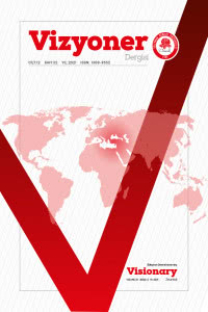Covid-19 Krizinin Sağlık Sektöründe Faaliyet Gösteren İşletmeler Üzerindeki Etkileri
Covid-19, İşgücü Piyasası, Eczane, Veteriner, Optisyen
The Effects of the Covid-19 Crisis on Businesses Operating in the Health Sector
Covid-19, Labor Market, Pharmacy, Veterinary, Optician,
___
- Atkeson, A. (2020). What will be the economic ımpact of covid-19 in the US? rough estimates of disease scenarios. national bureau of economic research. Erişim adresi: http://www.nber.org/papers/w26867, (23.04.2020).
- Barrot, J., Grassi, B. ve Sauvagnat, J. (2020). Sectorel effects of social distancing. Erişim adresi https://ssrn.com/abstract=3569446, (23.04.2020).
- Erdem, İ. (2020). Koronavirüse (Covid-19) karşı Türkiye’nin karantina ve tedbir politikaları. Turkish Studies, 15(4), 377-388. https://dx.doi.org/10.7827/TurkishStudies.43703, (15.12.2020).
- ILO. (2020). Social protection responses to the covid-19 crisis: country responses in Asia and the Pacific. Erişim adresi: https://www.social-protection.org/gimi/ShowWiki.action?id=62, (21.04.2020)
- IMF. (2020). World economic outlook. Washington D.C: International Monetary Fund. 2020 April, Erişim adresi: https://www.imf.org/en/Publications/WEO/Issues/2020/04/14/weo-april-2020, (26.04.2020).
- İnce, F. ve Evci̇l F. Y. (2020). Covid-19’un Türkiye’deki ilk üç haftası. Süleyman Demirel Üniversitesi Sağlık Bilimleri Dergisi, 11(2), 236-241.
- Jolevski, F. ve Muzi, S. (2020). Supporting vulnerable temporary workers and businesses coping with corobavirus challenges. (26.04.2020).
- Kara, E. (2020). Covid-19 pandemisi: işgücü üzerindeki etkileri ve istihdam tedbirleri. Avrasya Sosyal ve Ekonomi Araştırmaları Dergisi (ASEAD), 7(5), 269-282.
- Kıvılcım, B. (2020). Covid-19 (yeni koronavirüs) salgınının turizm sektörüne muhtemel etkileri. Uluslararası Batı Karadeniz Sosyal ve Beşeri Bilimler Dergisi, 4(1), 17-27.
- OECD. (2020). Supporting people and companies to deal with the covid-19 virus: options for an ımmediate employment and social-policy response. Erişim adresi: https://oecd.dam-broadcast.com/pm_7379_119_119686-962r78x4do.pdf, (26.04.2020)
- Rutkowski, M. (2020). How social protection can help countries cope with Covid-19. Worldbank. Erişim adresi: https://blogs.worldbank.org/voices/how-social-protection-can-help-countries-cope-covid-19, (26.04.2020).
- Torun Kayabaşı, E. (2020). Covid-19’un piyasalara ve tüketici davranışlarına etkisi. Avrasya Sosyal ve Ekonomi Araştırmaları Dergisi, 7(5), 25-15.
- WHO. (2020). WHO Director-General's opening remarks at the media briefing on COVID-19 - 11 March 2020. Erişim adresi: https://www.who.int/director-general/speeches/detail/who-director-general-s-opening-remarks-at-the-media-briefing-on-covid-19---11-march-2020, (13.12.2020).
- Yayın Aralığı: Yılda 4 Sayı
- Başlangıç: 2009
- Yayıncı: Süleyman Demirel Üniversitesi
Üniversite Öğrencilerinin Aile Finansal Sosyalleşme Düzeylerinin Para Tutumlarına Etkisi
Bilgehan KÜBİLAY, Özgür TUNÇEL
Biyopsikososyal Yaklaşım ve Gelişim Süreci
Kevser SEZER KORUCU, Şerife ÇALIŞKAN SÖYLEMEZ, Aygen OKSAY
Kültürel Ürünlerin Uluslararası Ticareti ve Ekonomik Büyüme: Panel Veri Analizi
Fatih Cemil ÖZBUĞDAY, Önder ÖZGÜR
BİST Sürdürülebilirlik Endeksine Alternatif Bir Yaklaşım: Finansal Göstergeler İle Bir Tahmin
Eda KÖSE, Ömer Serkan GÜLAL, Gökhan SEÇME
Cinsiyet Faktörüne Göre Sağlık Yöneticilerinin Yönetsel Güçlülüklerinin Araştırılması
Amerika Birleşik Devletleri: Hala Bir Süpergüç Mü?
Katılım Bankalarının CAMELS Oranlarının Analizi: MULTIMOORA ve MAUT Yöntemleri İle Bir Araştırma
Fatma YÖRÜK EREN, Aşkın ÖZDAĞOĞLU, İsmail BEKCİ
Türkiye’nin Avrupa Birliğine Sektörel İhracatı: Panel Veri Analizi
Narsist Kişilik Özelliklerinin İşkoliklik Eğilimine Etkisi
Türk Dış Politikasında Merkez Ülke Olma Yönelimi: Dönüşüm Mü, Devamlılık Mı?
